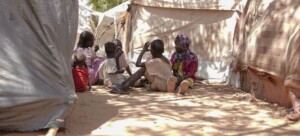More than 9 million Sudanese in need of aid in 2020
In Sudan, 9.3 million people -nearly one in four- will need assistance in 2020. The funding needed for these humanitarian interventions is $1.4 billion.
About 2.4 million children are acutely malnourished, the UN Office for the Coordination of Humanitarian Affairs in Sudan reported.
 Displaced preparing for the night in Jimam, Kurmuk locality, Blue Nile state (Radio Tamazuj)
Displaced preparing for the night in Jimam, Kurmuk locality, Blue Nile state (Radio Tamazuj)
In Sudan, 9.3 million people -nearly one in four- will need assistance in 2020, of whom five million are targeted to receive humanitarian assistance. The funding needed for these humanitarian interventions is $1.4 billion.
Malnutrition rates are high across the country – some 2.4 million children are acutely malnourished, the UN Office for the Coordination of Humanitarian Affairs (OCHA) in Sudan stated in its Situation Report on Thursday.
The major factor driving humanitarian needs in Sudan is the economic crisis. High inflation rates–which stands at 58 per cent, and rising prices are diminishing people’s ability to cope and contributing to worsening food insecurity.
Years of economic stagnation and little investment in already weak public systems have deepened needs across the country including in the central and eastern regions of Sudan.
Although initial reports indicate there was a relatively good harvest in 2019, it will not counteract the impact of price inflation. At least 17.7 million people (42 per cent of the population) suffer from some level of food insecurity. About 6.2 million people need food and livelihoods assistance.
In 2020, nearly 168 million people will need humanitarian assistance and protection. This represents one in about 45 people in the world and is the highest figure in decades. The United Nations and partner organisations aim to assist nearly 109 million of the most vulnerable people. This will require funding of $29 billion.
On December 4, the UN Global Humanitarian Overview (GHO) for 2020 was launched simultaneously in Geneva, Berlin, Brussels, London, and Washington DC. The GHO is the most comprehensive, authoritative, and evidence-based assessment of world’s humanitarian needs, OCHA states.
Radio Dabanga’s editorial independence means that we can continue to provide factual updates about political developments to Sudanese and international actors, educate people about how to avoid outbreaks of infectious diseases, and provide a window to the world for those in all corners of Sudan. Support Radio Dabanga for as little as €2.50, the equivalent of a cup of coffee.












 and then
and then